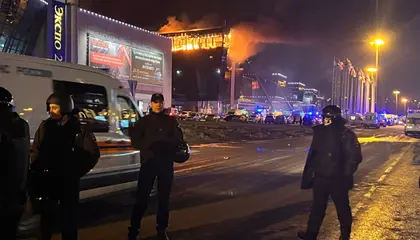Last week’s terrorist attack in Moscow was the worst to have been committed by the Islamic State in Europe, leaving many dead and injured.
ISIS-K claimed responsibility for the attack via the “Amaq News Agency,” which is linked to the terrorist organization. It published photos allegedly showing the four men behind the attacks.
JOIN US ON TELEGRAM
Follow our coverage of the war on the @Kyivpost_official.
Meanwhile, Washington had warned Moscow a few weeks before the attack that it might occur. The Kremlin labeled this a “provocation.”
According to US National Security Council spokesperson Adrienne Watson, the US warning is in keeping with America’s long-standing policy of “duty to warn” about potential terrorist attacks – regardless of the nation at risk.
It seems the Kremlin was taken by surprise after the attack, which led to public speculation about a variety of suspects and inconsistent narratives coming out of official Moscow. After a day of silence, Russian dictator Vladimir Putin went to the press claiming “radical Islamists” had perpetrated the attacks as part of “intimidation campaigns carried out by Kyiv.”
However, contrary to Putin’s first version – which claimed the terrorists were planning their escape to Ukraine – Belarusian dictator Aleksandr Lukashenko had already acknowledged that the terrorists planned to flee to Belarus after their attack. The story of what transpired at Crocus Hall bears the hallmarks of a smoke-and-mirrors show.

US Must Address Russian Disinformation to Strengthen US Election Integrity
A reign built on terrorism
Fighting against international terrorism has become Putin’s core message through the decades.
From the beginning of his presidency in January 2000, Putin pushed the idea of a concerted anti-terrorist campaign with American and European leaders. As soon as he took office – and even before, while prime minister or head of the FSB – the Kremlin began its long, bloody battle against “Chechen Islamists.”
Since then, the former KGB officer has consolidated his grip on power through a wave of popular support that has appeared to solidify with every brutal crackdown.
Fighting against international terrorism has become Putin’s core message through the decades.
Already in 1999, less than six months before Putin became president, while he was still a little-known prime minister hand-picked by Boris Yeltsin, Putin promised to punish those who had committed terrorist attacks on residential buildings in Moscow and two other cities in 1999. “We will pursue the terrorists everywhere. You will forgive me, but if we catch them on the toilet, we will wipe them out in the outhouse.”
Ironically, there are many Russians – including former FSB defector Alexander Litvinenko, killed in London in 2006 with a dose of radioactive polonium-210 – who sustain that the apartment bombings were an FSB false-flag operation and Putin himself was behind them.
After the 9/11 terrorist attack, when he briefly seemed to want to improve relations with the US, Putin was among the first to offer his assistance in America’s fight against terrorists.
Russia experienced more terror attacks: There was the 2002 hostage crisis at a sold-out performance of in Moscow’s Dubrovka theater with more than 100 deaths. Then came the 2004 Beslan school siege, North Ossetia, when a group of gunmen held the school hostage. In 2015 a Kogalymavia airline plane crashed, killing 224 on board after an explosive device reportedly detonated.
And now, there is the still-fresh attack on the Crocus City Hall, which left 139 dead and many more injured – with the numbers still rising.
A vulnerable Russia
As the Kremlin continues its own terroristic rampage in Ukraine, other terrorist organizations may use its vulnerability as a pretext for further atrocities on Russian soil.
Putin has earned many enemies across the globe, including terrorist organizations.
First and foremost is ISIS – as Moscow bore witness.
Russia has wound up in the crosshairs of ISIS because of its intervention in the Syrian Civil War, where its aviation has been bombarding both Syrian opposition forces and ISIS since 2015. Taking into consideration Moscow’s military failures in Ukraine, ISIS sees an opportunity to restore its influence in the Middle East by attacking Russia at home.
Secondly, the attack could be the direct result of the internal tensions within Russia, which has a disgruntled Islamic population. Russia’s Muslim minorities in Chechnya, Ingushetia, Dagestan, and other regions, have seen a disproportionate number of their men shipped off to die in Russia’s invasion of Ukraine.
Indeed, the alleged gunmen detained after the attack were Russian-speakers originally from Tajikistan.
Twenty-five years ago, terrorist threats became a cornerstone for Putin’s grip on power and now it may become the opposite.”
Thirdly, the attack could have been a “false-flag” operation by the FSB. Many unanswered questions suggest as much: Why did it take four hours for the police to get to the scene of the attack? How did the gunmen manage to flee approximately 340 kilometers (210 miles) at high speeds without being captured or even stopped in a tightly monitored police state like Russia? Why did Putin remain silent for 18 hours before trying to tie the terrorist attack to Ukraine? Why did Lukashenko say that they planned to escape through Belarus?
While we may still see a lot of fog surrounding whoever carried out the attack, the consequences now seem clear.
Russian military setbacks in Ukraine and the decline of Putin’s regime will only bring further destabilization on Russian soil, as Moscow’s many enemies begin to smell blood.
Twenty-five years ago, terrorist threats became a cornerstone for Putin’s grip on power. Now the tables may have turned – with Putin cornered. But unlike Ukraine, terrorist groups have no qualms about targeting civilians.
You can also highlight the text and press Ctrl + Enter






